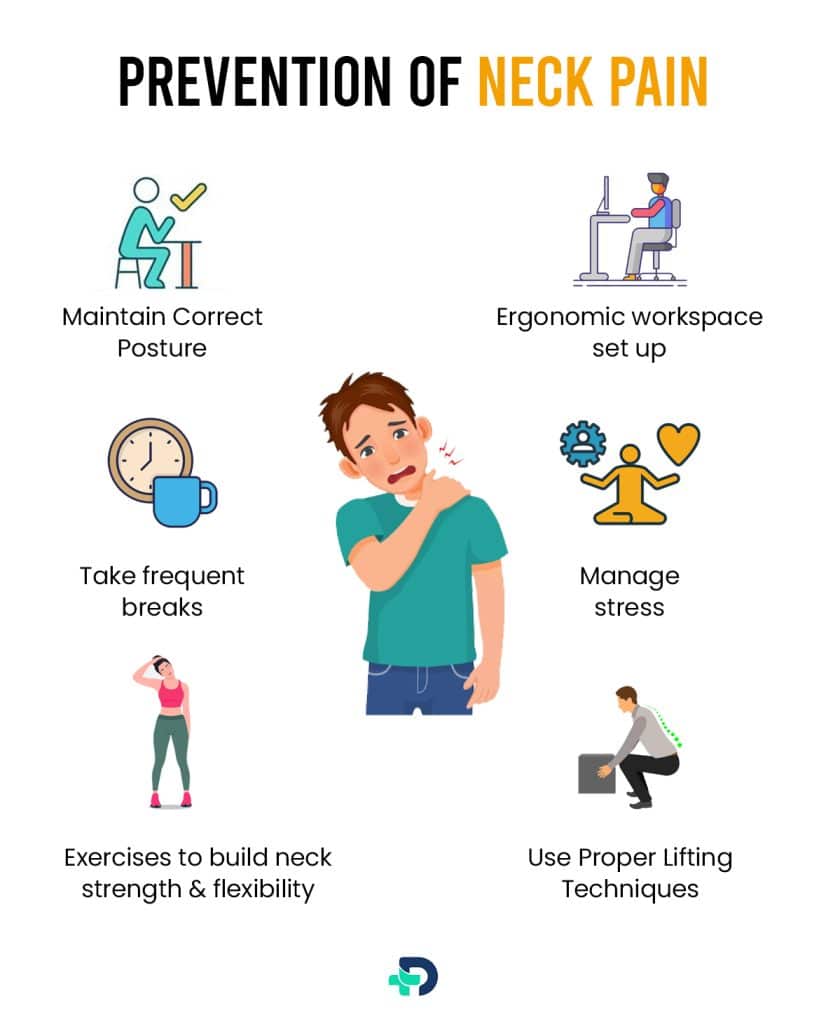Neck pain: What do you need to know?

- Neck Pain
- 17 Aug 2023
Overview
What is Neck pain?
Neck pain is a common condition that affects numerous individuals throughout the world and can produce mild to severe pain affecting an individual’s quality of life. The most common cause of neck discomfort or stiffness is poor posture, improper sleeping, or overuse. However, it may indicate a severe disease that requires immediate medical attention.
This article thoroughly overviews neck pain, including its causes, symptoms, risk factors, diagnosis, treatment choices, preventive measures, probable complications, and prognosis.

Symptoms
Neck pain Symptoms
Most common symptoms of neck pain may include:
- Neck stiffness.
- Limited range of motion.
- Sharp or dull ache in the neck.
- Muscle spasms or tension in the neck and upper back1Symptoms| Researched based study from Mayoclinic.org
The signs listed below for neck pain could indicate anything more serious and that one should seek emergency medical attention:
- Pain that gets worse and more severe with time.
- Headaches.
- Radiating pain to the arms, shoulders, or hands.
- Tingling or numbness in the arms.
- In severe situations, weakness in the arms or hands.
- Nausea, vomiting, dizziness, diarrhea, or light sensitivity.
Types
Types of Neck pain
Neck pain can broadly be of two types based on the duration:
- Acute
- Chronic
Based on the location of origin, neck pain could be:
- Axial
- Radicular
Acute
- Acute neck pain is fairly common and normally causes no concern.
- It normally goes off after one to two weeks2Types| Researched based study from Nlm.nih.gov
Chronic
- The pain lasts for over three months.
- When pain becomes chronic, psychological stress is often a factor.
Axial
- Most frequently felt in the neck, with occasional spread to the shoulders.
Radicular
- It spreads along the nerves.
- For instance, pain at the back of the head may travel to one of the limbs2Types| Researched based study from Nlm.nih.gov
Causes
Causes of Neck pain
- Muscle strain – Overuse or poor posture can cause muscle strain in the neck, sometimes referred to as a stiff neck.
- Aging – Neck pain and stiffness can occur due to the wear and tear of the discs in the neck as people age.3Causes| Researched based study from Clevelandclinic.org For example, degenerative disc disease, cervical osteoarthritis, spinal stenosis, herniated discs, and other complications.
- Injuries – like neck fractures, sprains, and strains- can result in short-term or long-term neck pain.
- Whiplash – a quick, violent movement of the neck backward and forward during accidents can result in neck pain4Causes| Researched based study from Hopkinsmedicine.org
- Spinal stenosis, or spinal canal narrowing, can stress nerves and the spinal cord, causing neck pain.
- Infections – Neck pain can be caused by viral or bacterial meningitis,5Causes| Researched based study from Clevelandclinic.org COVID-19, strep throat, tonsillitis, and others.
- Health conditions – Various medical disorders, including fibromyalgia, tumor or growths, rheumatoid arthritis, and cancer, can cause neck pain.
Risk factors
Risk factors
Several variables, including the following, may increase the likelihood of experiencing neck pain:
- Older individuals – are more at risk for age-related degeneration of the cervical spine.
- Gender – Women are more likely to be affected than men.6Risk factors| Researched based study from Nlm.nih.gov
- Poor posture – especially during prolonged sitting or computer use7Risk factors| Researched based study from Nlm.nih.gov
- Repetitive activities – like lifting heavy objects or participating in particular sports could increase the risk of straining the neck muscles.
- Previous neck injury or trauma – may increase a person’s risk of neck pain.
- Occupational – Some jobs may include frequent heavy lifting or repetitive neck movements.
- Anxiety and stress – raise the likelihood of muscle tightness in the shoulders and neck regions.
Diagnosis
Neck pain diagnosis
Doctors may undertake the following tests to find the cause:
- Medical history – the doctor may gather information about the patient’s past injuries, medical issues, and lifestyle factors.
- Physical examination – examining neck mobility and muscle strength and finding any pain or swelling.
- Blood tests – are used to identify an underlying inflammatory condition or infection.
- Imaging tests – X-rays, MRI scans, or CT scans may be performed to check the neck’s bones, discs, and soft tissues.8Diagnosis| Researched based study from Hopkinsmedicine.org
- Electromyography (EMG) measures electrical activity in muscles and nerves to diagnose problems9Stanfordhealthcare.org| Researched based study from Nlm.nih.gov
Treatment
Treatment of Neck pain
Treatment for neck discomfort is determined by the root cause and severity of symptoms and may include:
- Physical therapy – can increase neck mobility and relieve pain through stretching, strengthening, and manual treatment techniques.2Treatment| Researched based study from Nlm.nih.gov
- Medicines – like muscle relaxants, nonsteroidal anti-inflammatory drugs (NSAIDs), or other prescription pain medications may be provided to relieve pain.
- Corticosteroid injections – into the affected area can relieve severe neck pain and inflammation in the short term.10Treatment| Researched based study from Aans.org
- Transcutaneous electrical nerve stimulation – to provide tiny electrical impulses that may ease the pain.11Treatment| Researched based study from Nlm.nih.gov
- Neck Braces or Collars – to stabilize the neck and limit movements as it heals. However, wearing a collar for an extended period might weaken neck muscles, and removing it occasionally could prevent that.
- Surgery – if conservative therapy fails to relieve symptoms, surgical intervention may be explored to address the primary cause of neck discomfort, such as disc herniation or spinal stenosis10Treatment| Researched based study from Aans.org
Home remedies to manage Neck pain
To relieve neck pain at home, one can do the following:
- Take breaks, prevent repeated neck motions, and embrace appropriate posture.
- Apply cold or heat packs to the areas affected to decrease the swelling and pain.
- Use ibuprofen or acetaminophen as over-the-counter pain medications.
- Stretch the neck muscles gradually by doing slow neck range-of-motion exercises like up and down or side to side motion.
- Consider sleeping on a firm bed with a cervical pillow.12Treatment| Researched based study from Mountsinai.org
- To ease discomfort, consult a doctor about wearing a soft neck collar.
Alternate therapies may include:
- Acupuncture.
- Massage.
- Chiropractic therapy13Treatment| Researched based study from Acatoday.org
Prevention

Prevention of Neck pain
While not all cases of neck pain may be avoided, the following techniques may assist people in lessening their risk:
- Maintain Correct Posture – Sit or stand with a straight back, relaxed shoulders, and a head that aligns with the spine.
- Ergonomic workspace set up – with an adjustable chair, a suitable positioning for the keyboard and mouse, and a display at the eye.14Prevention| Researched based study from Aurorahealthcare.org
- Take frequent breaks – Avoid long periods of sitting or repetitive activity. Allow time to stretch and change positions.
- Exercises to build neck strength and flexibility – include neck rotations and moderate stretches.
- Use Proper Lifting Techniques – when lifting heavy goods, bend the knees, maintain a straight back, and lift with the legs instead of the back and neck.
- Manage stress – by trying stress reduction techniques like meditation or deep breathing or participating in hobbies to reduce muscle tension in the neck and shoulders.
Complications
Complications of Neck pain
With adequate therapy and self-care methods, most occurrences of neck discomfort recover within a few days to weeks. However, untreated or prolonged neck pain might result in consequences such as:
- Reduced mobility.
- Reduced quality of life.
- Fatigue.
- Sleep problems.
- Anxiety and depression.
- Poor work productivity,
- Impacted daily activities.
Prognosis
Prognosis of Neck pain
Neck pain is a pretty frequent condition that normally resolves on its own. However, in rare circumstances, it may return. Its outlook may vary based on its severity, cause, and other factors. Most people notice an immediate reduction in their symptoms and return to normal function with the correct diagnosis, therapy, and preventive measures. Medical consultation is essential for people with neck pain that persists or worsens.
Any feedback on this article?
 This Articles content was accurate
This Articles content was accurate Very Informative Article
Very Informative Article I have a question or a comment
I have a question or a comment
 This article contains inaccurate content
This article contains inaccurate content This article was not helpful
This article was not helpful I have a question or a comment
I have a question or a comment
We appreciate your helpful feedback!
Checkout our social pages
References
-
Mayo clinic
Neck pain | Symptoms
-
National Library of Medicine
Neck pain: Overview | Types
-
Cleveland Clinic
Neck Pain | Causes
-
Johns Hopkins Medicine
Whiplash Injury | Causes
-
Cleveland Clinic
Neck pain | Causes
-
National Library of Medicine
Female Gender Is Associated with a Higher Prevalence of Chronic Neck Pain, Chronic Low Back Pain, and Migraine: Results of the Spanish National Health Survey, 2017 | Risk factors
-
National Library of Medicine
Work-related Neck Pain Among Desk Job Workers of Tertiary Care Hospital in New Delhi, India: Burden and Determinants | Risk factors
-
Johns Hopkins Medicine
Neck Pain and Problems | Diagnosis
-
Stanford Health Care
Electromyogram (EMG) for Neck Pain | Diagnosis
-
American Association of Neurological Surgeons
Neck Pain | Treatment
-
National Library of Medicine
Transcutaneous electrical nerve stimulation (TENS) for chronic neck pain | Treatment
-
Mount sinai
Neck Pain | Treatment
-
American Chiropractic Association
Neck Pain | Treatment
-
Aurora Health Care
Tips for neck pain prevention | Prevention





































